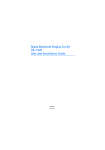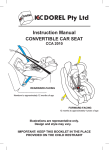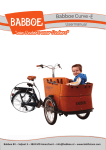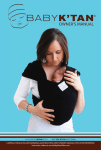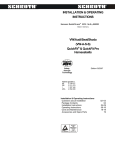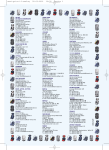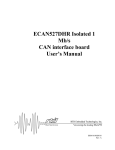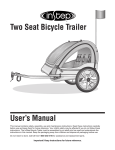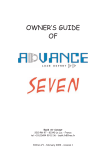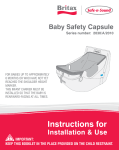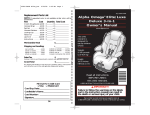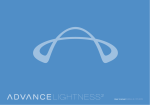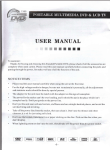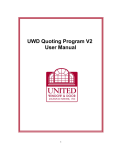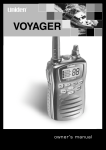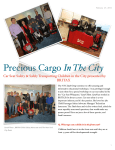Download - Maxi-Cosi
Transcript
Euro & Hera Convertible Car Seat To be used only in a rearward facing position until the infant’s shoulders reach the lower shoulder height marker (approx. 12 months of age). Then to be used in a forward-facing position until the child’s shoulders reach the upper shoulder height marker (approx. 4 years of age). IMPORTANT: KEEP THIS BOOKLET IN THE PLACE PROVIDED ON THE CHILD RESTRAINT. Table of Contents Welcome letter .............................................................................................................. 3 Warnings .......................................................................................................................... 4 Parts list ............................................................................................................................. 8 Transition period from infant to toddler use ................................................... 10 Vehicle information ................................................................................................... 12 Upper anchorage fitting installation ......................................................................... 12 Anchorage fitting installation ................................................................................... 13 Location of anchor fitting .......................................................................................... 14 Upper anchorage fitting installation (for sedans only) .......................................... 15 Correct rearward-facing vehicle position ............................................................. 16 Installation ................................................................................................................... 17 Angle adjustment ...................................................................................................... 17 Preparing infant seat to fit your child ....................................................................... 18 Shoulder height marker (rearward-facing) ........................................................ 21 Rearward-facing installation using seatbelt ........................................................... 22 Correct forward-facing vehicle position ............................................................... 23 Shoulder height marker (forward-facing) .............................................................. 24 Forward-facing installation using seatbelt ............................................................. 25 Lower connectors installation ............................................................................... 26 Rearward-facing .......................................................................................................... 27 Forward-facing ............................................................................................................ 27 Installation .................................................................................................................... 28 Installing locking clip (optional) ............................................................................... 28 Care and maintenance ............................................................................................ 29 Cleaning instructions for buckle .............................................................................. 29 Care instructions ........................................................................................................ 30 Removing trim for cleaning ...................................................................................... 30 Removing insert for cleaning .................................................................................... 31 Accessories (if supplied) ......................................................................................... 32 Belt mates ................................................................................................................... 32 The next seat for your child ................................................................................... 33 Notes ............................................................................................................................... 34 Guarantee ..................................................................................................................... 35 2 Dear customer, Congratulations on the purchase of your brand new Maxi-Cosi car seat, we hope you and your little one will have plenty of hours of fun together! Our car seats are produced with the greatest care and craftmanship backed by a 6 year warranty on the seat and 3 year warranty on the trimming. In the event of a car accident, your Maxi-Cosi child restraint may have unseen damage from crash forces. The Maxi-Cosi Accident Exchange Service offers new for old Maxi-Cosi child restraint replacement in the event of an accident, giving you peace of mind knowing your child is corectly protected. So there is nothing for you to worry about, just sit back and enjoy the ride where ever it may take you. We would love to hear from you! Nothing makes us happier and encourages us to continue developing the very best products available than hearing how it helped you enjoy your time together, on the go. Feel free to share you story on our Facebook page or our website. Enjoy your ride, The Maxi-Cosi Team Need assistance? Call our Customer Service Centre: 1300 809 526 Monday to Friday (8:30am-5:00pm AEST) or send an email: [email protected] www.maxi-cosi.com.au maxicosi.australia 3 WARNINGS Read and follow all of the installation instructions for maximum protection. If you have any questions regarding the installation or use of this restraint, please contact Dorel Australia or agent, or a child restraint fitting station authorised by the relevant transport authority, or in New Zealand, to consult the agent for the vehicle. •To be used only in a rearward-facing position until the infant’s shoulders reach the lower shoulder height marker (approximately 12 months of age). Then to be used in a forward-facing position until the child’s shoulders reach the upper shoulder height marker (approximately 4 years of age). •Continue to use this child restraint until the child reaches this limit. •Do not use forward facing until child’s shoulders are above the lower shoulder height marker. •Infants are at risk of serious injury if they face forward too early. •Children are at risk of serious injury if they move to booster seats too early. •Children who have outgrown this restraint are safest in a larger child restraint with an in-built harness or a booster seat until their shoulders reach the upper shoulder height marker of the restraint. GENERAL •Use the restraint exactly as shown in the instructions. •Supervision of children is needed because they may be able to undo the buckles. •DO NOT LEAVE CHILDREN UNATTENDED IN THE CAR. •Do not alter or modify this restraint. •Repairs must only be done by the manufacturers or agent. •Do not allow the restraint to come into contact with polishes, oils, bleach and other chemicals. •Destroy the restraint if it has been in a severe crash, even if no damage is visible •DO NOT USE THIS RESTRAINT WITHOUT THE COVER. •To ensure infant’s back is evenly supported, do not put more than one nappy on the baby and make sure the nappy is not thickly folded at the back. •DO NOT USE A REAR- FACING CHILD RESTRAINT WHERE AN AIRBAG IS FITTED IN FRONT OF THE SEATING POSITION. 4 WARNINGS •Fit the restraint firmly to the car seat. •Fit the harness firmly to the child. •A loose restraint or harness is dangerous. •Do not harness an infant wrapped in a blanket or swaddled. Any blanket or wrap must only be placed over the harness and infant. •Seatbelt extenders are not recommended to be used if the seatbelt is not long enough to secure the child restraint. If seatbelts are too short then advice should be sought from a child restraint fitter and their recommendation be considered before using a seatbelt extender. •Always secure the loose end of the top tether strap. Do not use the child restraint where this strap may fall into a split in the seat back or off the side of the seat. •Always secure the loose end of the top tether strap to prevent it hanging out of the car or being accessible by the child. •ALWAYS ATTACH HOOK AND REMOVE SLACK. •THIS RESTRAINT IS NOT SUITABLE FOR USE WHERE THE TOP TETHER STRAP MAY FALL INTO A SPLIT IN THE SEAT BACK OR OFF THE SIDE OF THE SEAT. •THIS RESTRAINT MUST BE ATTACHED TO A CHILD RESTRAINT UPPER ANCHORAGE POINT IN THE CAR. REFER TO CAR OWNER’S HANDBOOK FOR LOCATION OF UPPER ANCHORAGE POINTS. REFER TO A CHILD RESTRAINT FITTING STATION IF NO UPPER ANCHORAGE POINTS ARE IN THE MOTOR CAR. •Always check the measurements between the front of the seat back of the rear seat and all front seats in the car in which the child restraint is intended to be used, to ensure that the space is sufficient. •Care and attention be given to ventilation and shading of the occupant. •TO BE USED WITH A LAP-SASH/LAP-ONLY SEATBELT OR ISOFIX LOW ANCHORAGES IN THE FRONT/BACK OF MOST CARS WITH FORWARD FACING SEATS. 5 WARNINGS •The use of child restraints in the front seat may be restricted for children of specific ages by local legislation. Please check with your local legislation regarding any restriction for child restraint. If a car has two or more rows of seats, children under four must not travel in the front seat. If all seats, other than the front seats, are being used by children under seven years, children aged between four and six years (inclusive) may travel in the front seat, provided they use an approved child restraint or booster seat. •Use of aftermarket accessories (i.e. items not provided in the box with the child restraint), can reduce the safety provided by child restraint and may cause injury or death. For approved aftermarket accessories please refer to page 12. •Please contact Dorel Australia Customer Service with any questions or concerns. 6 7 Parts list 1 2 3 11 10 9 4 8 5 6 7 1 2 3 4 Air protect cell (x2) Height marker Stabilising arm Harness release lever (under flap) 5 Harness tightening strap 6 Base adjustment button (two positions) 8 7Base 8 Mesh pocket for lower connector (x2) 9Buckle 10Belt mates (x2) 11 Infant insert Parts list 12 13 14 15 16 17 12 Adjustable headrest (5 positions) 13Top tether strap 14Hook 15Anchor kit 16 Splitter plate 17 Forward facing belt path 22 21 20 19 18 18Lower connectors (x2) 19 Tension indicator (x2) 20Rearward facing belt path 21Storage pocket (instruction manual & excess tether strap webbing) 22Top tether strap adjuster 9 Transition period from infant to toddler use Lower height marker Rearward-facing MUST BE REAR FACING WHEN SHOULDERS BELOW THIS LINE NOTE: Turn the restraint from rearwardfacing to forward-facing once your child’s shoulders reach the lower height marker. ID 2. M IGH 3. H Front of vehicle Figure 1 A RE OW 1. L R B WA EL R T D PA FA TH CIN G REARWARD-FACING BELT PATH Forward-facing Upper height marker SHOULDERS BELOW THIS LINE WHEN HEADREST AT HIGHEST POSITION FO RW ARD NLY -FAC ING BELT PATH O FORWARD-FACING BELT PATH Front of vehicle 10 Figure 2 Transition period from infant to toddler use (cont’d) WARNINGS •To be used only in a rearward-facing position until the infant’s shoulders reach the lower shoulder height marker (approximately 12 months of age). Then to be used in a forward-facing position until the child’s shoulders reach the upper shoulder height marker (approximately 4 years of age. •Continue to use this child restraint until the child reaches this limit. •Do not use forward facing until child’s shoulders are above the lower shoulder height marker. •Infants are at risk of serious injury if they face forward too early. •Children are at risk of serious injury if they move to booster seats too early. •Children who have outgrown this restraint are safest in a larger child restraint with an in-built harness or a booster seat until their shoulders reach the upper shoulder height marker of the restraint. •The child restraint is unsuitable for the occupant when the shoulders are below the lower marker or above the upper marker. The child needs to be moved into the next form of child restraint (booster seat) when they reach the top shoulder height marker. NOTE : • If the baby’s neck muscles are unable to support their head, then the child should remain rear facing. 11 Vehicle information Location of anchor fitting Figure 3 NOTE: •The anchor point can be found in different locations in different cars. The illustration above shows possible locations of anchor points. Sometimes it is on the parcel shelf in sedans, and on the floor area in station wagons, vans and hatchbacks. Make sure that you do not confuse the luggage hook in the back of a station wagon with anchor points. Refer to your owner’s manual. •An extension strap may be needed for vehicles without a fixed parcel shelf. Extension straps and extra fittings are available from various stores. 12 Extension straps 300mm ref no. 014398 Extension straps 600mm ref no. 014399 Anchor bolt kit ref no. 014400 Locking clip ref no. 014401 Vehicle information Anchorage fitting installation Child restraints must be used correctly to provide proper protection for your child. The anchorage system on child restraint must be used in the correct way. CORRECT Make sure there is no slack in the top strap and the attachment clip is upright in the anchorage fitting. INCORRECT The clip must not lie flat on the anchorage fitting. INSTALLATION CORRECT INCORRECT Make sure there is no slack in the top strap and the attachment clip is upright in the anchorage fitting. The clip must not lie flat on the anchorage fitting. Figure 1. Anchorages in vertical panel at rear of vehicle Figure 2. Floor mounted anchorages 13 Vehicle information Upper anchorage fitting installation FOR CARS FITTED WITH A CHILD RESTRAINT UPPER ANCHORAGE POINT Locate the upper anchorage point behind the rear seating position (consult the car owner’s handbook for the location of the upper anchorage point). Remove the thread plug from the parcel shelf/floor/roof and install the attachment bolt as shown in Figure 3. CAUTION: DO NOT OVERTIGHTEN THE ATTACHMENT BOLT. MAXIMUM TORQUE 20 Nm. Attachment bolt Lock washer Anchor fitting Spacer(s) (if required) Vehicle metal structure Vehicle trim Front of vehicle Figure 4 FOR CARS NOT FITTED WITH A CHILD RESTRAINT UPPER ANCHORAGE POINT For sedans only Drill a 9mm diameter hole in the parcel shelf on the centre-line of the seating position as shown in Figure 4. Install the anchor bolt as shown in Figure 5. It is recommended that this installation be carried out by a child restraint fitting station or licenced motor mechanic. For vehicles other than sedans In Australia, consult your nearest child restraint fitting station or traffic authority for vehicle inspection to find the best, correct position for the placement of the upper anchorage point, and for the correct attachment bolt length and use of spacers. In New Zealand, consult the agent for the vehicle. WARNING: CHILD RESTRAINTS MUST NOT BE ATTACHED TO UNSOUND METAL OR TO WOOD, OR SYNTHETIC STRUCTURES. WHEN DRILLING THE 9mm HOLE DO NOT DRILL THROUGH FUEL LINES, FUEL TANKS, ELECTRICAL WIRING, OR RADIO SPEAKERS. WEBBING STRAPS MUST BE PROTECTED FROM SHARP CORNERS AND EDGES. THE ANCHOR FITTING MUST BE USED ONLY AS DESCRIBED ABOVE. IT MUST NOT BE HOOKED ONTO ANY OTHER OBJECT. 14 Vehicle information Upper anchorage fitting installation (for sedans only) Centre line of seating position Figure 5 Attachment bolt Anchor fitting Spacer(s) (if required) Vehicle trim Vehicle metal structure Reinforcing washer Lock washer Nut Front of vehicle Figure 6 15 Vehicle information Correct rearward-facing vehicle position Some seating positions in your vehicle may NOT be safe for this safety seat. Some vehicles do not have any seating positions that can be used safely with the seat. If you are not sure where to place the infant seat in your vehicle, consult your vehicle’s owner’s handbook. Vehicle Seat Location Requirements Children are safer when properly restrained in rear vehicle seating positions. Whenever possible, secure the infant seat in the centre position of the seat directly behind the front seats. CORRECT USE Figure 7 CORRECT USE Figure 8 390mm 640mm Figure 9 WARNINGS IMPROPER PLACEMENT OF THE SAFETY SEAT INCREASES THE RISK OF SERIOUS INJURY OR DEATH. 16 Installation Angle adjustment Position seat ensuring that the angle is no greater than 40˚ from horizontal plane. Angular adjustment is achieved by adjusting the base. Refer to page 19 for base adjustment. 40˚ Front of vehicle Figure 10 WARNINGS • DO NOT install convertible child restraints excessively reclined, ensure the angle is no greater than 40°. • DO NOT adjust harness or tether strap hardware such that it sits too close to the occupant. • Ensure that correct seatbelt path is used and that the restraint is installed in the correct direction for rearward facing application. Refer to page 22 • DO NOT wrap baby in a blanket or swaddled as infant can be ejected and killed in an accident. • Ensure the harness fits the baby firmly. • Ensure that any blanket or other covering may only be placed over the harness after the harness is adjusted firmly. • The infant’s legs are not be bound or wrapped together and the arms are not bound or wrapped together. 17 Installation Preparing infant seat to fit your child You MUST make these adjustments with your child before you install the child restraint in the vehicle. Please adjust harness according to the infants shoulder height prior to installation. (air) Configuring the harness belt for shoulder height (air) 3 Adjuster clamp (Lift lever) 1.Lift the harness release lever at the front of seat. 2.Pull one side of the shoulder strap to loosen 3.Press red button to release buckle assembly for ease of child fitment. Pull harness straps over sides of infant seat. Place child in seat. 5 Figure 11 Adjuster belt 4 Adjust headrest height 4. Rotate harness height adjustment levers inward. Move headrest to the proper height and lock into place. 5. Fasten buckle assembly (See Page 19). Pull the adjuster belt at the front of the seat until the harness belt lies firmly against the child. Figure 12 WARNINGS • • 18 Always adjust the height of the shoulder straps as the child grows. Failure to fasten and tighten the harness system correctly can result in serious injury or death. Installation Preparing infant seat to fit your child (cont’d) Click! STEP 1 STEP 4 STEP 3 STEP 2 Figure 13 To fasten buckle assembly Release: Press the red button to release the buckle. 1: Insert one buckle tongue as shown above (you will not hear a click). 2: Insert the second buckle tongue as illustrated above. Now listen for a ‘CLICK’. 3: Remember to always pull up on the harness straps to make sure buckle is locked tightly. Base adjustment * PUSH base adjuster in red under front seat and rock seat to adjust the base. (3 positions) PUSH OW 1. L 2. M AR RE Red base adjuster under front of seat ID 3. H IGH B WA EL R T D PA FA TH CIN G Figure 14 WARNINGS DO NOT LEAVE CHILDREN UNATTENDED IN THE CAR 19 Installation Preparing infant seat to fit your child (cont’d) PULL TO LOOSEN PULL BUTTON Figure 15 PULL TO TIGHTEN PULL BUTTON Figure 16 Adjusting top tether strap TO LOOSEN: Press on the adjuster button with thumb and pull strap back through to loosen anchorage strap using strap which is attached to the seat (Figure /). TO TIGHTEN: Adjust anchorage strap and remove slack. Pull loose end of strap to tighten (Figure /). NOTE: Store the excess webbing in the pocket provide at the back of the child restraint. WARNINGS CAUTION: CHILDREN CAN BE INJURED OR RESTRAINTS AND TOP TETHER STRAP DAMAGED BY UNSECURED CARGO IN A COLLISION. SECURE OR REMOVE HAZARDOUS CARGO BEFORE USING THIS CHILD RESTRAINT. Always secure the loose end of the top tether strap to prevent it hanging out of the car or being accessible by the child. When not in use, fold hanging tether strap and place in storage pocket provided. 20 Installation Shoulder height marker (rearward-facing) REARWARD FACING (Newborn to 12 months) Shoulder strap The shoulder straps must be in the slots which are nearest to the child’s shoulders, but not lower than the child’s shoulders. Figure 17 MUST BE REAR FACING WHEN SHOULDERS BELOW THIS LINE Front of vehicle Figure 18 21 Installation Rearward-facing installation using seatbelt NEWBORN TO 12 MONTHS 1.Set base in position 3 (High) 2. Swing stabilising arm into position. 3.Place restraint facing rearwards on back seat of vehicle in line with an anchorage strap anchorage point. 4.Thread the vehicle seat belt through the BLUE belt path at the front of the restraint and fasten buckle. 5.Press the child restraint into the vehicle seat and remove belt slack. 6.Attach the anchorage strap to the anchorage point. Adjust until all the slack is removed. Ensure Base of seat is not lifted. STABILISING ARM RECLINE ARM PRESS HERE REARWARD-FACING BELT PATH REARWARD-FACING BELT PATH Figure 19 NOTE: Ensure the harness is pulled through the mould & trim all the way and correctly tensioned. Front of vehicle WARNINGS DO NOT LEAVE CHILDREN UNATTENDED IN THE CAR 22 Installation Correct forward-facing vehicle position CORRECT USE Figure 20 CORRECT USE Figure 21 INCORRECT USE Figure 22 23 Installation Shoulder height marker (forward-facing) Strap can be next slot above FORWARD FACING (12 months to 4 years) Child Shoulders Strap cannot be more than 25mm below The shoulder straps must be in the slots which are nearest to the child’s shoulders, but not more than 25 mm below the child’s shoulders Figure 23 SHOULDERS BELOW THIS LINE WHEN HEADREST AT HIGHEST POSITION Front of of vehicle Front vehicle Figure 24 The child restraint is unsuitable for the occupant when the shoulders are below the lower marker or above the upper marker. The child needs to be moved into the next form of child restraint (booster seat) when they reach the top shoulder height marker’. WARNINGS DO NOT LEAVE CHILDREN UNATTENDED IN THE CAR 24 Installation Forward-facing installation using seatbelt TODDLER 12 MONTHS TO 4 YEARS OLD NOTE: Before you start installation, adjust the shoulder straps and headrest to fit your child. Refer to page 14. 1. Adjust the child restraint to the forward facing position by placing restraint on back seat of vehicle in line with an anchorage point. FORWARD FACING BELT PATH PULL SEATBELT PRESS DOWN 2. Thread the vehicle seat belt through the YELLOW forwardfacing belt path. 3. Place one hand on seat, press the child restraint into the vehicle seat and pull on seatbelt to remove slack. 4. Attach the upper anchorage strap to the anchorage point. Adjust until all the slack is removed. NOTE: If the car seatbelt is not long enough to secure the child restraint, DO NOT USE SEAT BELT EXTENDERS. Figure 25 25 Lower connectors installation LOOK FOR THESE SYMBOLS FOR ATTACHMENT IN VEHICLE ISOFIX Figure 26 WARNINGS IMPORTANT Do not attach the lower attachment connectors of two separate child restraints to the same ISOFIX low anchorages in your car. Always attach the top tether strap to the child restraint upper anchorage in your car. Child restraint lower attachment connectors and the ISOFIX low anchorages in your car are designed to withstand only those loads imposed by a correctly fitted child restraint. • Never place a child rear-facing in a seating position with an active frontal airbag. This can result in serious injury or death. • Do not use the lower connectors along with the vehicle lap or lap/shoulder belt. • Check lower connector strap before each use. Use only if the strap can be tightened properly and securely. • Do not use both the lower connectors and vehicle belt at the same time. • Failure to follow these warnings can result in serious injury or death. • Failure to securely attach child restraint to base can result in serious injury or death. 26 Lower connectors installation Rearward-facing LOWER ATTACHMENT CONNECTORS Figure 27 1. Set base in position 3 (High) 2. Swing stabilising arm into position. 3. Place restraint facing rearwards on back seat of vehicle in line with an anchorage strap anchorage point. 4. Fasten the lower attachment connectors to the anchor in the vehicle seat located in the vehicle seat bight. Repeat for other side of base. 5. Pull on the adjuster strap next to the lower connectors and remove slack. Repeat for other side of base. 6. Check for the green indicator on the lower connectors adjuster. If indicator is red then take out slack on the belt. If indicator is green, then your restraint is secure. 7. Attach the anchorage strap to the anchorage point. Adjust until all the slack is removed. Ensure Base of seat is not lifted. Forward-facing Figure 27 1. Adjust the child restraint to the forward facing position. Fold the Stabilizer Arm if the restraint has been used for rear facing. 2. Adjust the base to suit your child as fitment in some vehicles can be impacted due to the location of anchorage points, or the shape of rear seats, (3 positions base adjustment). Place restraint facing forwards on back seat of vehicle in line with an anchorage strap anchorage point. 3.Adjust the shoulder straps and headrest to fit your child. Refer to page 18. 4.Place restraint facing forwards on back seat of vehicle inline with an anchorage strap anchorage point. 5.Fasten the lower attachment connectors to the anchor in the vehicle seat located in the vehicle seat bight. Repeat for other side of base. 6.Pull on the adjuster strap next to the lower connectors and remove slack. Repeat for other side of base. 7.Check for the green indicator on the lower connectors adjuster. If indicator is red then take out slack on the belt. If indicator is green, then your restraint is secure. 8.Attach the anchorage strap to the anchorage point. Adjust until all the slack is removed. Ensure Base of seat is not lifted. 27 Installation Installing locking clip (optional) A B C D E F Using the seat belt locking clip to convert a lap-sash belt to a lap only belt. NOTE: Locking clip can be fitted on either side depending on the vehicle seatbelt and child restraint configuration. 1. Using a locking clip (Figure A) to convert a lap-sash belt to a lap only belt. 2. Hold the lap and sash straps (Figure B) together. Thread webbing (still pinched) into the locking clip, one side at a time (Figure C & D) 3. Repeat step 2 for the other slot in the locking clip. (Figure E & F ) 4. Feed the straps through the locking clip to remove any slack. 5. If the locking clip is on correctly, it will hold the lap belt securely, if the lap belt slips repeat the previous steps. 6. Locking clips are available from most speciality outlets or from Dorel Australia Customer Service (1300 809 526) NOTE: The locking clip must be removed when the child restraint is not installed to allow other users to use the seatbelt as a lap-sash seatbelt. The locking clip shall not create unacceptable slack in the seatbelt. 28 Care and maintenance Cleaning instructions for buckle Follow the manufacturer’s instructions at all times. Before removal, ensure you have carefully noted the way which the various parts are attached to the seat so as to facilitate reassembly. Your child car seat is equipped with a buckle designed to give your child maximum protection during proper use. When working properly, your buckle should always fasten with an audible ‘CLICK’. If sticky liquids (such as baby food, fruit juice, etc.) get into the buckle it may become sluggish and you will not hear a ‘CLICK’. The buckle should be cleaned by following the steps below. push metal rod into slot Figure 29 Figure 30 Figure 31 1. Fold seat cover and foam back from buckle, using a flat edged screwdriver gently lift one end of rod out releasing crotch buckle. Repeat for other side. 2. As illustrated in Figure 29 place the buckle unit under running water (40 degrees Celsius) Let the water flow through the mouth of the buckle for one minute 3. Simultaneously latch and unlatch the tongues into the buckle several times until a strong audible click is heard. Refer to Figure 30. 4. If you still cannot hear a strong audible click after latching the buckle several times. repeat steps 2 and 3. 5. DO NOT oil any part of the buckle. 6. Allow buckle to dry. 7. Refit crotch buckle ensuring RED button is facing out. 8. Thread the webbings as shown with arrows in Figure 31. 9. Put the 2 metal rods back into the webbing loops and push into the slots. 10.Pull the buckle to make sure that it is fitted properly. 11.If the buckle does not return to original working order, contact Dorel Australia Customer Service on 1300 809 526 29 Care and maintenance Care instructions • • • • • • • Seat trim may be removed for cleaning. Don’t forget to remove the instruction manual. Tumble dry 10-15 minutes on low heat. Do not dry clean. All other surfaces should be cleaned with a mild soap and water. Never clean with bleach or spirit-type cleaners. Do not use the restraint without the cover. Check the webbing for fraying. Remove trim for cleaning TO REMOVE HEADREST TRIM 1. Move headrest to highest position. 2. Remove the 2 elastic straps on the back of the headrest. 3. Peel the trim off the headrest. 4. Remove Air Protect cells (x2). Important: Do not wash trim with Air Protect cells still inside. TO REPLACE HEADREST TRIM 1. Move headrest to highest position. 2. Replace Air Protect. 3. Put the headrest trim on. 4. Clip the 2 elastic straps to the plastic tabs at the rear of headrest. TO REMOVE SEAT TRIMS 1. Undo shoulder straps from the splitter plate. 2. Pull straps through the cover. 3. Remove the 4 plastic clamps on the front and rear of seat. 4. Remove the seat trim from the seat. TO REPLACE SEAT TRIM 1. Put the seat trim on the seat. 2. Feed the shoulder straps through the cover. 3. Attach the plastic clamps. 3. Attach the shoulder straps to the splitter plate. Elastic Figure 32 Figure 33 SPLITTER PLATE Figure 34 NOTE: ENSURE HARNESS IS NOT TWISTED Take extra care to be sure the harness is reinstalled correctly and the shoulder straps are of equal height through both the trim and the harness slots of the seat. 30 Care and maintenance Remove insert for cleaning To remove insert To remove the insert, separate the snaps in 2 places. Refer to illustrations. Undo the buckle and pull the insert out. To replace insert Feed the crotch part of the buckle through the opening slot in the insert. Place the shoulder straps as illustrated and attach the snaps in 2 places. Fasten buckle assembly. SNAPS Figure 35 Figure 36 Figure 37 WARNINGS VERY IMPORTANT: Only replace the cover with a manufacturer’s supplied replacement cover with identical shoulder height markers or a replacement cover meeting AS/NZS 8005. 31 Accessories (if supplied) Belt mates NOTE: Before fitting covers, remove harness from splitter plate (see page 19). • Fit belt mates to harness strap by threading the strap through the belt mate. Figure 38 • Repeat for both sides. • Thread harness straps back through harness slots. NOTE: Refit splitter plate before continuing. (see page 19). Figure 39 32 The next seat for your child option 1: Harness forward-facing car seat To be used only in a forward-facing position by a child whose shoulders are above the lower shoulder height marker (approximately 6 months of age) until the child’s shoulders reach the upper shoulder height marker (approximately 8 years of age). option 2: Booster seat To be used with a lap-sash seatbelt by a child whose shoulders are above the lower shoulder height marker (approximately 4 years of age) until the child’s shoulders reach the upper shoulder height marker (approximately 6 to 8 years of age). Can also be used with child harness that is approved for use with this booster seat. option 3: Larger booster seat To be used with a lap-sash seatbelt by a child whose shoulders are above the lower shoulder height marker (approximately 4 years of age) until the child’s shoulders reach the upper shoulder height marker (approximately 8 to 10 years of age). Can also be used with child harness that is approved for use with this booster seat.* for more information, visit www.maxi-cosi.com.au 33 Notes 34 Guarantee Dorel Australia Pty Ltd warrants your new product to be free from defects in materials and workmanship for 6 years on the seat & 3 years on the trim, from the date of purchase, provided that the product is used in accordance with accompanying recommendations or instructions where provided. The benefit of this warranty is in addition to your rights under the Australian Consumer Law and to other rights and remedies of the consumer under a law in relation to the goods or services to which the warranty relates. Dorel Australia Pty Ltd will provide you with your choice of a refund, repair, or exchange (where possible) for this product if it becomes defective within the warranty period. Dorel Australia Pty Ltd will bear the reasonable expense of claiming the warranty. This warranty will no longer apply where the defect is a result of alteration, accident, misuse, abuse, or neglect. Please retain your receipt as proof of purchase and contact our Customer Service team on Ph: 1300 809 526 or alternatively, via our website at www.dorel.com.au for any difficulties with your product. Warranty claims and claims for expense incurred in returning this product can be addressed to our Consumer Service team at 655-685 Somerville Road, Sunshine West, VIC, 3020. Hours: 8:30 am to 5:00 pm, Monday to Friday. For New Zealand please contact Customer Service Centre, 14 Sir William Avenue, East Tamaki, Auckland, 2013. Auckland: (09) 2741040 NZ wide: 0800 628 000 (Toll Free). Hours: 8:00 am - 5:00 pm, Monday to Friday. Our goods come with guarantees that cannot be excluded under the Australian Consumer Law. You are entitled to a replacement or refund for a major failure and compensation for any other reasonably foreseeable loss or damage. You are also entitled to have the goods repaired or replaced if the goods fail to be of acceptable quality and the failure does not amount to a major failure. IMPORTANT: KEEP THIS INSTRUCTION MANUAL IN THE POCKET PROVIDED ON THE HEADREST. Australian Standard AS/NZS 1754 Lic 1491 SAI Global 35 Europe’s most popular and trusted car seat brand. Australia © 2014 Dorel Australia, Pty Ltd. All Rights Reserved. CCA 2013 L #015459 08/14




































